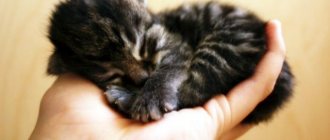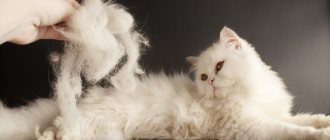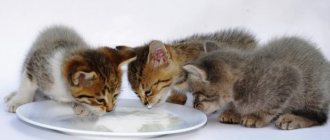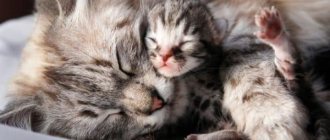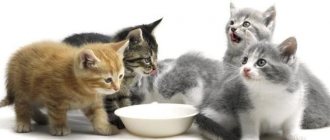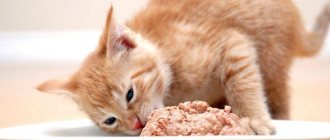09/07/2015 Category: Pets Author: Natalya Ivantsova
When kittens are born, it is very important to properly care for them. They are born deaf and blind, but from the first days they already have a keen sense of smell and touch.
It is important that they are near their mother. If you get kittens without a cat, you will have to care for them yourself.
- What to feed a newborn kitten?
- What to do if your cat has mastitis
- How to care for your baby?
- Can it be washed?
- Toilet
- Removing fleas
- Signs that a kitten was born sick
- Video. Caring for newborn kittens
Arrangement of the place and its heating
It is better to purchase a bed or incubator for kittens in advance
It is necessary to prepare a comfortable place for the kittens in advance. An incubator or a special bed is suitable for this. You should not place it close to heating devices or a radiator, as kittens can quickly overheat. Also, you should not heat the area with the crumbs with lighting fixtures. This can have a bad effect on the children's vision and affect their fragile eyes.
Useful information: A heating pad is best for heating the area. Take a simple bottle and fill it with warm water (up to 35°), then wrap it in a towel and place it in the bed. In the second week of life, you can gradually reduce the water temperature to 28°, in the third – to 24°. There is no need to add colder water.
Don't push your cat to cheat
The four-legged beauty often becomes not only a beloved pet, but also an equal member of the family. Owners, especially single people, overly pamper the cat, pamper it too much, pay it too much attention, and the cat begins to take on the role of a leader, psychologically subjugating the person. The animal commits impermissible actions, misbehaves, while its tricks remain unpunished and not even reprimanded. Excessive care and failure to respect the natural hierarchy can have dire consequences if the cat becomes pregnant and gives birth to kittens. The mother will simply ignore the children, preferring to communicate with a person. Adequate behavior on the part of the owner should bring the irresponsible mother to reason and become a salvation for the furry family.
A cat can “cheat” on its offspring not only with a person, but also with other people’s kittens. It happens that an animal begins to care for the children of another cat, and other people’s children are often older than their own. The “forgetful” mother should be reminded who is who and return her to her native nest.
During the postpartum period, it is necessary to closely monitor the cat's condition. High temperature, lack of appetite, depressed state, thick, dark discharge on days 2-7 may indicate that the new mother has a dangerous disease - acute metritis. Another pathology that poses a serious threat to the life of a cat is eclampsia, which manifests itself in rapid breathing, pale mucous membranes, an extremely excited or, conversely, unusually lethargic state, and elevated temperature (up to 41 ° C). And refusal to eat, hyperthermia, swollen, painful red-blue mammary gland are signs of acute mastitis. If you notice the above alarming symptoms, immediately seek help from a veterinarian.
What to feed a newborn kitten?
While feeding, hold the kitten in your palm and give it a bottle with a nipple or a pipette
Of course, the best food for newborn kittens is mother's milk. But sometimes you have to feed the babies yourself. However, even if the cat feeds her children herself, then already at 4 weeks of life you will have to feed the babies. A few spoons of milk per day will be enough. Kittens can also be fed milk powder. To do this, dilute it with honey and a spoonful of sugar and pour in water.
In the first month of life, it is better not to feed babies too rich milk. Gradually increase the amount of complementary foods, and in the second month you can start giving liquid milk porridge. If you feed kittens yourself from the first days of their life, then get ready for some difficulties. The fact is that this must be done every 2.5 hours, including at night. The most convenient way to feed kittens is with a bottle with a nipple or a pipette. It is better to make a little milk mixture so that there is no excess left, since it cannot be stored for a long time in its finished form. The bottle must be sterilized and cleaned before each feeding.
Useful information: If you feed babies with a pipette, do not put it deep into the kitten's mouth, as the liquid may enter the respiratory tract. We advise you to hold them in your arms in a straightened position. This will make it easier for kittens to eat, and they will also be able to burp air.
In the second month of life, you can also add meat, ideally dietary meat, to your kitten’s daily diet. Moreover, it can be given both boiled and raw. Roll the meat into a small ball and place it in your baby's mouth. After the kitten has tried the new food, you can introduce liquid chicken or fish puree mixed with rice into the diet. Beef will also work. When introducing new products into the diet, you should not stop giving your babies milk porridge. Without it, it will be difficult for the kitten to go to the toilet (constipation will form). Feed your babies cottage cheese, and already at 9 weeks you can gradually switch them to food.
At birth, kittens weigh up to 120 g. With normal development, they will gain 100 g every week. Moreover, boys gain weight a little faster than girls.
If you notice that the weight does not increase over several weeks, consult your veterinarian. Perhaps the kitten is sick and needs help.
Milk replacers and formulas for feeding kittens
To feed kittens that are not ready to eat adult food, industrial milk substitutes and formulas are used. A milk replacer should not be too high in calories, since gaining excess weight at such a young age is fraught with improper development of the heart muscle.
When using balanced mixtures, the daily food intake for kittens is calculated based on their weight:
- From birth to 7 days – 30 ml per 100 g. body weight.
- From 7 to 14 days – 35 ml per 100 g. body weight.
- From 14 to 21 days – 40 ml per 100 g. body weight.
- From 21 to 28 days – 45–48 ml per 100 g. body weight.
- From day 28 – at least 50–53 ml per 100 g. body weight.
It is necessary to take into account that artificial kittens make a sharp leap in gaining weight and height immediately after the start of feeding.
After 3-4 days, the rate of weight gain noticeably slows down and stabilizes. If your kitten is not gaining weight well, it is best to contact your veterinarian.
Industrial cat milk substitutes
Industrial cat milk replacers are sold in pet stores and veterinary pharmacies. The most common cat milk substitutes are:
- Katzenmilch.
- Hartz milk powder.
- Babycat Milk (Royal Canin).
- Nurturall-C.
- Beaphar Kitty-Milk.
- Nutri Vet.
- Just Born.
- Gimpet Cat-Milk.
- Pet Lac.
The undisputed leader in the above list is the cat's milk replacer from the Royal Canin brand. The manufacturer offers a starter kit, which comes with a special bottle.
Important! Milk may not be suitable for the baby due to individual characteristics. If an allergic reaction or individual intolerance occurs, the kitten should be switched to infant formula or a home-made cat's milk substitute.
Infant milk formulas for kittens
You can use infant formula for kittens that have reached 3-4 weeks of age. To feed your baby, you must choose a formula designed for babies, without added flavorings and sugar. The most popular formulas for feeding kittens are:
- Nutrilon.
- Nestozhen.
- Little Istrinsky.
- Baby.
Baby formula is higher in calories than cat milk, but is an excellent alternative for active, fast-developing kittens. When using infant formula, the baby must be given a drug that eliminates increased gas formation.
Scott's Kitten Mix
At home, you can prepare Scott's formula for kittens. This recipe was invented long before the production of industrial cat milk substitutes and was considered one of the most “successful” alternatives for feeding kittens.
Recipe:
- Homemade, not separated cow's milk – 50 g.
- Powdered milk – 15 gr.
- Dry yeast (nutritional) – 3 gr.
- Chicken egg (yolk and white) – 50 gr.
- Chicken egg white, beaten until foamy – 50 g.
- Sunflower oil, refined – 1 gr.
- Glucose (powder or pharmacy) – 4 g.
Preparation:
- Place all ingredients in a ceramic bowl.
- Mix the mixture thoroughly with a whisk until a homogeneous mass is formed.
- Using a syringe, take out the required amount of the mixture.
- Warm the mixture to 38 degrees before feeding.
The mixture is stored in a refrigerator in a ceramic container covered with cellophane and paper. Shelf life no more than 3 days!
Tailing mix for kittens
A simplified recipe for home preparation - Tailing mixture for kittens. Tailing's formula is not entirely suitable for newborn babies, but for three-week-old kittens, it is an excellent alternative.
Recipe:
- Homemade, not separated cow's milk – 25 g.
- Powdered milk – 5 gr.
- Glucose (powder or pharmacy) – 2 g.
- Vitamin supplements for kittens (industrial) – 1 g.
Preparation:
- Place all ingredients in a ceramic bowl.
- Mix the mixture thoroughly with a whisk until a homogeneous mass is formed.
- Using a syringe, take out the required amount of the mixture.
- Warm the mixture to 38 degrees before feeding.
The mixture is stored in a refrigerator in a ceramic container covered with cellophane and paper. Shelf life no more than 3 days!
What to do if your cat has mastitis
Mastitis can be life-threatening for cats and kittens. At the first symptoms of the disease, kittens must be weaned and the cat must be shown to a veterinarian
If a cat has mastitis, the kittens will have to be switched to artificial nutrition. This disease occurs when milk stagnates in the mammary glands. To avoid mastitis, the cat owner must ensure that the kittens suckle from all nipples in turn. If the disease has already manifested itself, you need to immediately relieve the pain syndrome and in the future ensure that mastitis does not worsen.
For treatment, you can use camphor oil. To do this, apply it to a scalded cabbage leaf and apply it to the sore nipples. In advanced cases, septic mastitis appears. It differs in that bloody purulent discharge appears from the nipples. In this case, you must definitely contact a veterinarian: such a condition can threaten the life of a cat and even kittens.
Possible complications
A newborn kitten is weak and defenseless, its health requires constant attention from its owners. If the slightest deviation is detected (eyes that do not open in time, insufficient weight, lack of mobility of the hind limbs, etc.), you should immediately invite a veterinarian to your home. Most often, owners encounter the following problems:
- Fading kitten syndrome. Malnutrition of the embryo during gestation leads to the birth of a weakened baby with insufficient weight, poorly developed muscles and weakened immunity. It will take a lot of attention and effort to get such a baby out on his own.
- Dehydration (dehydration). Sudden weight loss, redness and dryness of the mucous membranes of the mouth and tongue, lethargy and general weakness indicate dehydration.
- Conjunctivitis. It can occur as a result of infection due to physical damage to the eyelid or due to infection with the herpes virus in the womb. Signs of conjunctivitis include inflamed, reddened eyelids, as well as the appearance of discharge.
- Inflammation of the navel as a result of infection. To prevent inflammation, immediately after the birth of the baby, the umbilical stump should be treated with a disinfectant solution.
It should be remembered that kittens that do not receive colostrum from their mother in the first days have weakened immunity and are more susceptible to diseases.
How to care for your baby?
When kittens become active, spend several hours a day playing with them.
It is worth remembering that babies develop very quickly. They open their eyes for the first time on the 8th day of life, and in the second week they begin to hear. At this time, it is important to carefully monitor the cleanliness of the bed, babies and cat. It is important that kittens' ears and eyes are always clean.
Useful information: If improper care is taken, purulent discharge may appear. In this case, be sure to invite a veterinarian to your home. Do not take children out of the house under any circumstances, because infectious diseases develop quite quickly in a weakened body.
Of course, newborn kittens need to gain strength so that they grow up healthy and active. Therefore, you should not disturb them unnecessarily. From the 3rd week they begin to walk independently, and they will have to devote a lot of time. Play, pet and pick up the kittens more often. So the babies will grow up very playful and affectionate, they will be attached to their owner.
Children who have not been given enough attention will become aloof and wild.
Vitamins and supplements for kittens at 3 weeks
At three weeks of age, the kitten’s body is intensively preparing for the transition to adult food. To digest complementary foods, the kitten's microflora must become more aggressive and its immunity more active. In addition, the kitten must receive enough taurine, which is included in industrial milk replacers.
If you are feeding your kitten formula or a natural milk replacer, vitamins and supplements will be needed. Natural sources of taurine that can be given to a three-week-old kitten are:
- Homemade live yogurt.
- Whole milk.
Pharmacy vitamins can be carefully introduced into the milk formula and first complementary foods:
- Fish fat.
- Omega-3, Omega-6.
- B vitamins.
Note! Fish oil and B vitamins can cause diarrhea, so introduce them into your kitten’s diet very gradually!
Toilet
Start toilet training your kittens as early as possible
It's quite easy to train kittens to use the litter box. The main thing is to start doing this as early as possible (you can even when they have not yet been weaned from their mother). From the 8th day, the kittens' eyes are already open, and the babies are actively moving. If their bed is located close to the litter box, the cat will help them move there to relieve themselves. If you raise babies yourself, then you will have to take on this concern yourself. Until the baby is 3 weeks old, his toilet must be organized after each feeding. This needs to be done gradually:
- First, wrap your baby in a slightly dampened cloth. Linen is ideal. This will be, so to speak, an imitation of licking by a cat. During this procedure, gently massage the kitten's tummy to improve its digestion.
- Massage your baby's inner thighs as close to the urethra as possible.
If you follow these tips correctly, no problems will arise. You should know that newborn kittens pass stool once every few days. Urination should be more frequent. If your kitten can't go to the toilet and is constipated, change its diet. Give only liquid milk porridge or food that is familiar to him. Just chop it finely and mix with warm water.
Make sure that kids do not eat litter from the tray. This may harm their health. Many litters contain chemical compounds, and when dirty, they become a source of infection.
Silence in the house!
A cat's maternal instinct can fail due to human fault. Newborns attract too much attention. Curious children often gather around them, make noise around their beloved pets, fuss, and pick up kittens. Such unnecessary intervention can easily cause a cat’s psycho-emotional disorder and, as a result, its rejection of its offspring.
You should not provoke trouble in the cat family. The best manifestation of care and attention on the part of a person towards pets is to create a favorable environment for them in the house, eliminate stressful situations, protect the nest from external irritants, and darken its location. In such a house the animal will feel calm and safe, and the kids will grow up in normal conditions.
A cat can “cheat” on its offspring not only with a person, but also with other people’s kittens. It happens that an animal begins to care for the children of another cat, and other people’s children are often older than their own.
Removing fleas
There are not many ways to remove fleas from kittens. These include:
- Combing with a comb and mechanical destruction of insects;
- Bathing babies with special shampoos;
- Using flea drops.
Single preparations that can be used for kittens under two months of age should be used only after they are weaned from their mother, just like shampoos. Otherwise, the chemicals will be licked off by the cat and then end up in the baby's body.
Therefore, the most reliable and safe, albeit time-consuming, way to remove fleas from babies is to comb them out with a soft but dense comb, catching and destroying the parasites.
Be healthy, kitty!
The unsatisfactory physical condition of the mother in labor is also one of the reasons leading to her rejection of kittens. It is important to determine what is bothering the cat and what is sick. Mastitis, eclampsia (milk fever), acute metritis and other complications, as well as various postpartum infections - this is not a complete list of possible ailments. Kittens in such a difficult situation are artificially fed, and their mother is treated.
Separately, we note that eclampsia can be triggered by poor nutrition of a pregnant cat and insufficient intake of vitamins and microelements into its body. To avoid unpleasant postpartum moments, you should take care of your pet’s health in advance, in particular, the composition of food and its quality.
Determining whether a cat has enough milk is not difficult. If newborn kittens gain weight, sleep well, do not squeak and look calm, then their mother has no problems with lactation. Otherwise, the babies will need to be fed additionally. Be sure to try to find a nurse cat for them - she will provide the brood with adequate nutrition. Your search was unsuccessful? No problem! By properly organizing artificial feeding, you can handle this important and responsible mission yourself.
Signs that a kitten was born sick
If a kitten’s eyes do not open for a long time, a veterinarian will solve this problem in a few minutes.
It happens that the baby is born very weak. To grow it healthy, you need to carefully monitor any changes in its condition. Keep an eye on the following details:
- Eyes. If they have not opened before the 17th day of life, then you need to consult a doctor for a simple operation.
- Sky. Sometimes kittens have a congenital defect - cleft palate. If milk leaks through the nostrils when the kitten drinks, unfortunately, the animal is doomed. It will not be able to eat normally in the future.
- Limbs. It often happens that newborn babies have paralysis of their hind legs. This disease occurs when muscles degenerate.
Eye problems can be easily resolved with the help of a veterinarian. The last two, unfortunately, cannot be eliminated in any way. They will interfere with the kitten's normal life. However, if you can take care of it, the animal will grow up loyal and happy.
Caring for newborn kittens
If a 3-day-old kitten is abandoned by a cat, it requires care almost around the clock. During the first days, he should be surrounded by maternal warmth and, if it is not there, he will have to create it artificially using a heating pad. Wrap it in a towel and place the kittens on it. The temperature of the heating pad should be about 37–38°C.
Place the kittens in a large box and take it to a quiet, warm and comfortable place. After all, now caring for a newborn kitten without a cat will be your main occupation. Cover the makeshift house halfway for warmth. The place where the kittens will be most of the time should be wide so that the kids can move.
Make sure the kittens don't freeze. Then their paw pads will be cold. If you have other animals, if possible, isolate them for at least three weeks until the babies' eyes open well.
Is it true that artificial kittens get sick more often?
There is a persistent myth according to which kittens deprived of their mother's milk will suffer from some illness throughout their lives. Allegedly, they have extremely weak immunity and a digestive system that has been torn since childhood.
As usual, there is some truth here. Breast milk is really difficult to replace with artificial formula, and the consequences of such feeding can appear years later. But think about this - millions of human babies are raised on formula and are no different from those people who were breastfed as children.
Kittens receive protection from infections from mother's milk only in one case - if antibodies to viruses are in the blood of the cat itself. This is called colostral immunity. If a nursing cat has not been vaccinated, then her kittens are just as defenseless against viruses as bottle-fed kittens. Babies receive preventive vaccinations as early as possible (the first at 2 months with revaccination at 3 months). And complementary foods are introduced as quickly as possible, nevertheless continuing to give a cat's milk substitute for up to 1.5-2 months.
Rumors about the illness of orphaned kittens have a different background. For example, a pregnant cat was starving, which prevented the correct formation of the fetuses.
If the cat lived in good conditions, and the kittens received good genes from both parents, then artificial feeding will not prevent the babies from growing into beautiful and healthy animals.
Don't worry if
But in these cases, on the contrary, there is no reason for concern. All that is required on your part is patience and feeding.
- The cat has slight bleeding from the genitals. Gradually their volume should decrease and disappear within 2-3 weeks.
- The kitten has only one eye open. This is considered a variant of the norm; the eyes open gradually and not always at the same time.
- The cat lies down on the kittens. In this way she tries to warm them up. Don't interfere, just try to maintain the optimal temperature in the room.
- The mother decided to move the kittens to another place, taking them by the withers. Don’t interfere with her, just make sure that the new “home” is as comfortable as possible, far from noise and people, and that the cat herself feels good.
Elena Shlykova
Taking care of your health
A homebody cat is not immune from infection by parasites and viruses. For this reason, it must be regularly treated against various pests and vaccinated.
Treatment for ectoparasites
Preparations for fleas, ticks and other ectoparasites are used during periods of increased activity, before mating and vaccination. The method and frequency of use depend on the type of product chosen.
Deworming
Treatment for worms is carried out every quarter or every six months. Deviation from the schedule is possible only with direct infection or vaccination, participation in exhibitions, travel abroad, as well as with surgical intervention.
When do you get vaccinated and get a veterinary passport?
The first vaccination is given at 2-2.5 months, that is, after separation from the mother. All data on the administered drug is included in the veterinary passport, so this document is created after the first application.
The decision on castration, sterilization and their timing
The ideal age for surgery is 7-8 months. It is recommended to sterilize the cat before the onset of her first heat, as this reduces the likelihood of developing cancer in the future to 0.5%.
What should you buy for your baby first?
Before the arrival of a new family member, you need to arrange a personal corner for him and take care of buying basic things. Thanks to the inviting environment, your mustache will get used to the change of residence much faster.
Tray, filler and scoop
To relieve yourself, you will need a closed or open tray. The first type perfectly masks odors, but due to its impressive size it often crowds the human toilet. The second type often confuses people with dirt. Because of this, experienced owners recommend taking a model with a mesh and placing the filler not on top, but directly under it.
The filler itself is:
- woody;
- grain or paper;
- silica gel;
- clay or mineral.
Each type has its pros and cons, so study them carefully before purchasing. You will need a scoop to pour the filler. It can be purchased at any pet store or replaced with a children's spatula.
Carrying
This accessory will be needed not only for traveling to the country, but also for going to the veterinary clinic. If you are planning a long trip on a train or plane, choose a hard plastic model. In other cases, you can get by with a soft fabric carrier.
Please note that interactions with doctors rarely leave pleasant memories. If you take out the carrier only for this purpose, your pet will begin to hide from it under the sofa. For this reason, it is better to store it in a visible place so that the cat gets used to its smell.
Bowls for food and water
The required number of bowls depends on the diet. At a minimum, you will need 2 pieces: for food and fresh water. Another one may come in handy when feeding wet canned food.
The most reliable materials are metal and ceramics. Cheap plastic products quickly absorb foreign odors, and dangerous bacteria settle in their cracks.
Bed
The baby will choose a sleeping place on his own, so do not rush to install a cat bed without his consent. An open lounger or a special house is suitable for sleeping and relaxing. The first option is ideal for an unobstructed view of the territory, and the second is indispensable for modest pets who love silence.
scratching post
Without this item, you can say goodbye to your favorite sofa and recently hung wallpaper. For an active mustache, a large play complex with several tiers is suitable, where he can sharpen his claws, have plenty of fun and even sleep. For calm animals, a simple scratching post will suffice.
Feed
It all depends on age. If your baby has already started teething, then choose the type of food that is comfortable for you: natural or dry. The quality of the finished granules must be no lower than premium, since consuming economy grains can result in serious health problems.
We're already big
From the age of six months, teenage kittens begin puberty, and within a few months they become adults. Now they are independent and can separate from their mother. The cat treats the remaining individuals in the family differently. She is friendly towards females, but rejects males. This behavior is understandable and logical from the point of view of the laws of nature: “dislike” for a son prevents inbreeding. If the guy has nowhere to go due to, for example, limited space, the cat may change its position over time, which will most likely lead to inbreeding. What the new brood will be like, with or without anomalies, depends on the parents. Note that felinologists often cross close relatives in order to develop a new breed or to consolidate some desired characteristics. However, it is better for the average animal owner to prevent such a phenomenon, since its consequences can be extremely sad: the litter will end up with ugly and sick kittens.
Feeding. Transition to solid foods
After three weeks, kittens should be weaned off their mother's milk by offering them solid food. Gradually introducing your babies to solid food will benefit both their health and the health of your cat. Receiving a small amount of food from your hands, the kittens will suckle their mother less and less each time. However, do not forget that the process should be gradual.
Buy canned or dry food for kittens, which you will first soak in water. Place a tiny piece of food on your finger and place it under your kitten's nose or lips.
For more information about what foods you can feed a small kitten, read our article: “What to feed a kitten? List of products by age."
